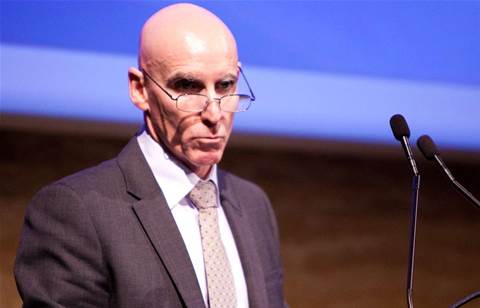NBN Co chief Mike Quigley has rejected accusations of a backflip on supplier standards after network builder Silcar returned to the deal table just months after he blasted the construction industry for attempting to fleece taxpayers.
The network chief faced three hours of questions from a parliamentary inquiry last night on the single source deals it had so far signed with Silcar and Fujitsu for construction in brownfields and greenfields network build areas respectively.
Quigley came under particular scrutiny over the resurrection of negotiations for mainland work after NBN Co sensationally suspended its tender process in April, citing price as the stumbling block.
He sought to assure the committee last night that the $1.12 billion deal with Silcar signed last month was about more than price but did not go into details, allegedly over concerns that disclosure of the other conditions - such as amended risk profiles - might undermine negotiations with other prospective contractors.
"You can be assured we did not just look at price. We looked at price, risk, conditions," he said.
Greenfields 'panel'
Quigley also reiterated some of the reasons NBN Co had gone with a single greenfields construction partner, rather than a panel arrangement as had been flagged earlier this year.
New estates were best served by one experienced partner with considerable experience, rather than a panel of suppliers, Quigley said.
NBN’s shock decision on Fujitsu disappointed Greens Senator Scott Ludlam, in particular.
“It has led and will lead to accusations that this is just another example of competition being collateral damage on the path to a national broadband network,” Ludlam observed.
“It was the Government’s intention that you at least evaluate the possibility of taking on other parties to do the greenfields work."
Quigley protested that NBN Co did evaluate the proposal, but he reiterated that the prospect of integrating numerous technologies and systems made a panel arrangement “quite a difficult job”.
Some tenderers fell short in terms of their ability to work in some areas. “They only wanted to work in specific locations,” Quigley said.
Managing them would have been complex and time scales were “very tight... so we went for the option that was going to give us the best in reliability in terms of ongoing maintenance of the network, and the lowest cost that was achievable, to allow us to actually do the job.”
Deployment on track
Earlier in the hearings Quigley gave an update on the progress NBN Co had achieved.
“According to our corporate plan we projected that we would have passed 13,000 brownfield premises by the end of June. I am pleased to report that as at the end of June, we have passed 14,256 premises.”


.png&h=128&w=207&c=1&s=1)




_(21).jpg&h=142&w=230&c=1&s=1)
.jpg&h=142&w=230&c=1&s=1)




.jpg&w=100&c=1&s=0)











